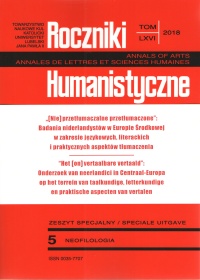Power and poverty of little words: Business (and other) texts in translation
Abstract
This article presents an attempt at a typology of the most frequent errors occurring in the translation from Dutch into a foreign language. The material under analysis derives from the translation tasks performed by the students of Dutch as well as by the newly graduated B.A. holders. The causes of the errors are to be found in the shortened education cycle of language studies which had been longer before the Bologna Treaty was signed and the five-year studies were divided into two independent shorter cycles. Other causes are also related to easy access to not necessarily reliable dictionary courses and Internet translators, of which Google Translator is an example, and to the fact that the graduates who completed their studies in a significantly shorter period of time and less effortlessly (than those who had completed five-year studies) demonstrated inflated self-confidence.
References
Europees Referentiekader (z.d.) www.erk.nl ingezien op 20 november 2017.
Flor-Górecka, Agnieszka. 2015. ‘Enkele specifieke fouten van Poolse vreemdetaalleerders Nederlands.’ In Bas Hamers (ed.). Pedagogiek van het Nederlands als vreemde taal. Centraal-Europese studenten en het Nederlands, 83–94. Olomouc: Univerzita Palackého v Olomouci.
Jutten, Joost. 2016. Vertaalfouten gemaakt door beginnende vertalers Portugees-Nederlands: een definitie, een categorisatie en de oorzaken. Antwerpen: Universiteit Antwerpen.
Naaijkens, Ton, Cees Koster, Henri Bloemen & Caroline Meijer (eds.). 2004. Denken over vertalen: Tekstboek vertaalwetenschap. Nijmegen, Nederland: Vantilt.
Saternus, Tatiana. 2018. Rozmowy fotelowe: Mirosław Dworniczak. https://www.dropbox.com/s/f5l8wlwvqbr7goe/Miroslaw%20Dworniczak_1.pdf?dl=0 ingezien op 10 juni 2018.
Van Dale Groot woordenboek der Nederlandse taal. www.vandale.nl ingezien op 10 juni 2018.
Voellnagel, Andrzej. 1998. Jak nie tłumaczyć tekstów technicznych. Warszawa: Tepis.
Copyright (c) 2018 Roczniki Humanistyczne

This work is licensed under a Creative Commons Attribution-NonCommercial-NoDerivatives 4.0 International License.





